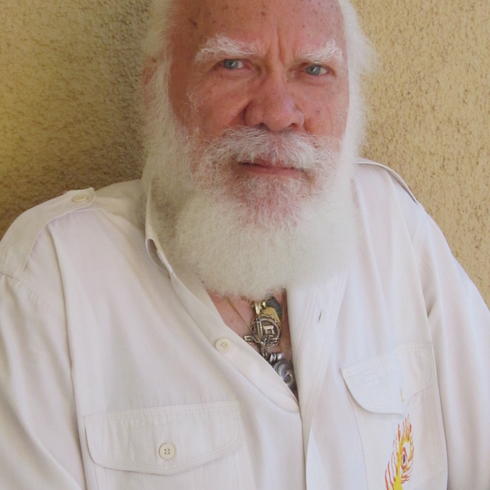
" Melovivi ou le piège "
- Nominated for : The Literary Prize 2012
Born in Haiti in 1936, Frankétienne is a poet, playwright, painter, but also a musician, singer and teacher. Under the dictatorship of the Duvaliers, while many haitian intellectuals left the country for Canada, France or Africa, Frankétienne decides to stay in Haiti. His works are therefore rooted in the contemporary history of Haiti. In 2010, he is made Commandeur des Arts et des Lettres.
Frankétienne is notably renowned for his important poetic work which includes the collection of Au Fil du temps (1964), La Marche (1964), Mon côté gauche (1965) Chevaux de l’avant-jour (1965) and Oeuf de lumière / Huevo de luz (2000)
His book, Mûr à crever (1968) "presents itself as a key access to the spiraliste movement created by the author; it is pertinent to read it before starting other works by this major author." (Note by the Editor)
According to Frankétienne, "The spiral represents a new genre that permits translating the palpitations of the modern world. The spiral work is constantly in movement. This is what partly explains the series of breaks in the development of the text. Moreover, it is not necessary to build up the work from a specific subject. From then on, writing becomes a real adventure, that of a multi-polar where each word, playing the role of a trigger, is capable of transforming itself into a core ready to crumble, giving birth to other verbal entities. In this sense, the spiral is basically an open work never completed. The spiral is an attempt to capture reality in its diverse aspects."
Released in 1972, Ultravocal "is the matrix of all Frankétienne’s work, in which the aesthetics of chaos is expressed with rare intensity, when the first forces of evil still growl, and when the lava in fusion of great mythologies takes shape in us. Quite simply, a masterpiece." (Presentation by the editor)
"We emerge deeply shaken by the lecture of Ultravocal, finally measuring the signification of this profession of faith that the haitian giant brandishes like an identity card:" I write, therefore I exist. "Frankétienne is a force in progress, a standing man who refuses to abandon himself to the capitulations of intelligence, of these self-abdications, all these tiny renunciations that forge good conscience and make mediocre literature." (Francis Busnel, Lire, June 1st, 2004)
In the total style of a spiral, he published many books: Zagolkoray (1983); Fleurs d’insomnie (1986); Adjanoumelezo (1987); Voix marassas (1998), La nocturne connivence des corps inverses (1996); D’une bouche ovale (1996) La méduse orpheline (1996) Une étrange cathédrale dans la graisse des ténèbres (1996) Clavier de sel et d’ombre (1997)Les échos de l’abîme (1997) Et la voyance explose (1997); Rapjazz, journal d’un paria (1999); H'Eros chimères (2002); Miraculeuse (2003); Galaxie Chaos-Babel (2006) La Diluvienne (2006); Heures brèves (2007); Le Sphinx en feu d’égnimes (2007); Corps sans repères (2007); Amours, délices et orgues (2008).
In 1975, Frankétienne published his first novel in peasant creole, Dézafi. Four years later, he proposed a french translation of it, Les Affres d’un défi that is really a complete rewrite of this founding text of haitian literature.
In 1998, he continued in the novelistic style with the eight volumes of Métamorphoses de l’Oiseau schizophone. "L’Oiseau schizophone (neologism) is the artist with a cut voice, in a language that is, at first, broken off from the current language, but finally, in everyday life, when we realize the "jargon" and the loss of words, of this pollution in speech level, is it rather not this quite strange language made of sonorities, of inconceivable neologisms used in excess that is the only one capable of dismissing this "chaos" in which we find ourselves? It's funny that there is an affinity, a relationship between chaos and emptiness; note that emptiness does not exist, we cannot conceive emptiness anywhere. Therefore, this language is in a state of chaos, ideological emptiness, sentimental. Haiti is not the only country in crisis; Haiti is a reference in the world, an enlarged image of the world wide discontent. [...]" (Interview with Anne Marty, "Haiti en littérature", Paris: La Flèche du Temps / Maisonneuve & Larose, 2000)
Anthologie secrète (2005) is "A strange and free book, which reassembles interviews, photos, various texts, archival documents and unpublished works of Haiti's most mysterious author, the craziest and most free. Author of more than forty books of all styles: fiction, poetry, drama, Frankétienne is today one of the greatest literary figures of the Caribbean." (Presentation by the editor)
Melovivi ou Le piège followed by Brèch ardente (2010) "In the early days of December 2009, Frankétienne finalized his new play, Melovivi ou Le piège. Stage directions: "Two individuals, A and B, are trapped, confined in a dilapidated space, desolate, without issue, following a tragedy. To not die in this place of confinement, they talk, déparlent, rave on the misfortunes caused by predators of the planet. " What is extraordinary in this text explosive with power, is as much the gift of prophecy as the gift of writing. Frankétienne then imagines two men sitting on the brink after a siesme. A month and a half later, what was written happens. [...] Melovivi is a superb text that must be read aloud. This gives the full measure of the creative power of Frankétienne, one of the great writers of the French language.
(François Busnel, Lire, 2nd June 2010)

